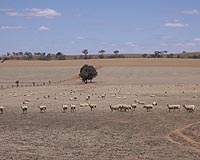Syria drought causes 50% drop in agricultural output

Damascus, Syria, 7 August 2009 (UPI) – The drought that has kept Syria dry for three years has cost more than 800,000 people their livelihoods, Red Cross and Red Crescent officials said. The International Federal of Red Cross and Red Crescent Societies this week said about $300,000 had been set aside for immediate assistance for about 40,000 people in Syria in the most need. Studies by international groups, including the Syrian Arab Red Crescent Society, said about 60,000 families have migrated from drought-affected areas, with most of the migrants leaving northeastern Syria, an area considered the country’s “breadbasket” because of its importance to agriculture.
Families are selling their belongings to buy food, and many children under the age of 3 are malnourished, a release by the Red Crescent society said. Parents are pulling children from schools and putting them to work to provide income for families.
The drought, which began in 2008, came shortly after an even more severe drought the previous two years. Rainfall totals were 15 percent to 30 percent of average for most grain-producing areas in the 2008-09 growing season. This was after rainfall averaged less than 2 inches from September 2007 to April 2008.
“There is still enough food in Syria to go around,” a World Food Program spokesman told the United Nations’ Integrated Regional Information Networks. “But we are worried about the provision of basic materials. It is a dangerous indicator for Syria that last year we had to import wheat.”
Agriculture output has fallen 50 percent since 2007 as many farmers have gone two years without crops, leading Syria last year to import wheat for the first time. Livestock owners with medium- to small-sized herds have lost 80 percent of their flocks because pasture and fodder aren’t available, officials said. [more]